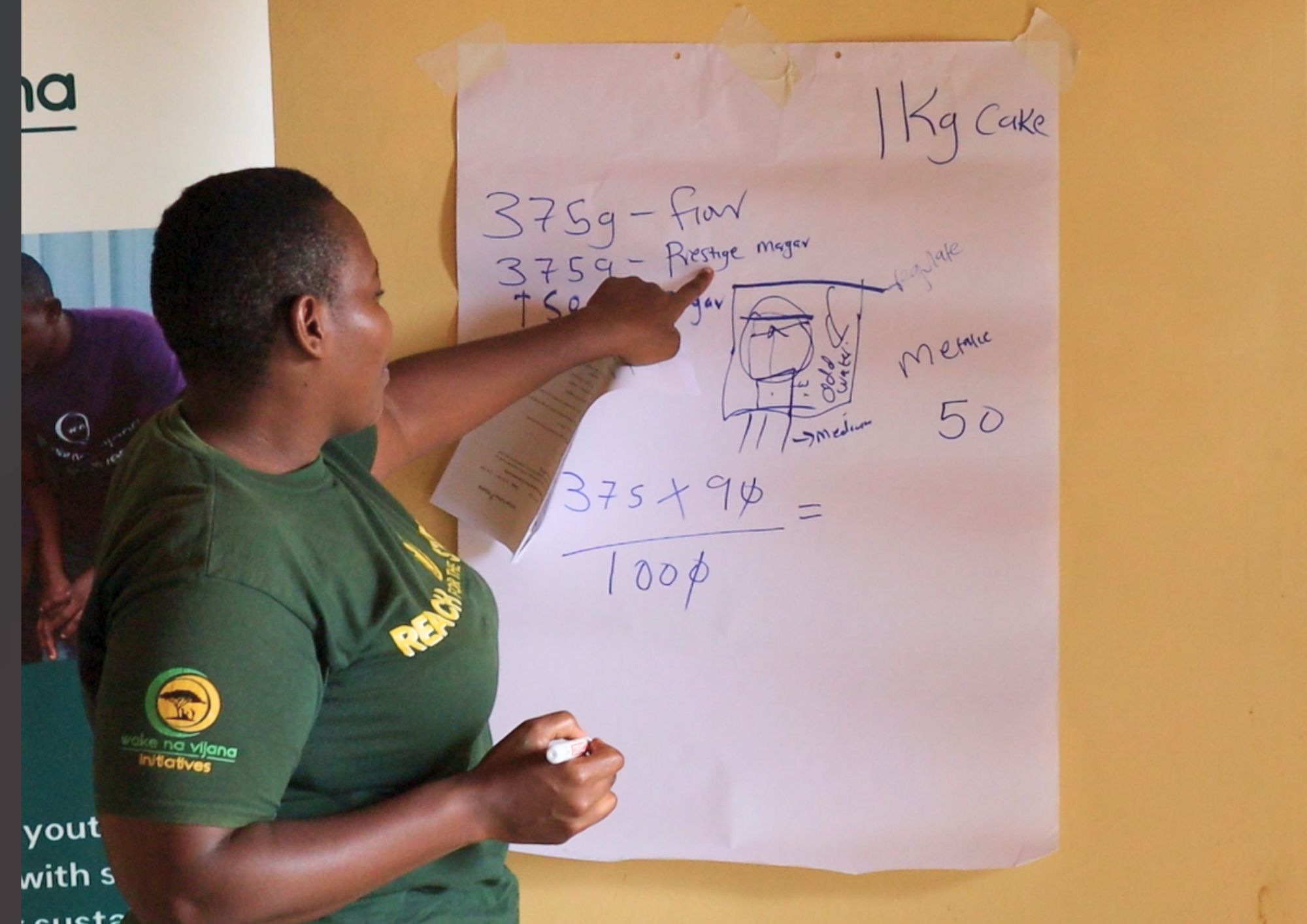







Imarisha Wake:
On May 28th, we held an Imarisha Wake session in Muchatha, building on our previous training where our participants learned how to bake a cake using a charcoal stove ‘jiko’. This follow-up session focused on a vital next step: pricing the cakes and profiling of products in the market.
Ahead of the session, we had encouraged participants to try baking at home using the resources they had. We kicked off by gathering feedback on their experiences, how the home baking went and what challenges they encountered.
We were impressed by the positive feedback, despite the challenges shared. It was inspiring to see how resourceful and innovative our participants had been in their home baking attempts. Ann, one of our committed participants and grocery owner, shared how they used a double-sided grill pan to bake instead of a cooking pot ‘sufuria’ and add coco in the cake mixture to create a chocolate flavored cake. Faith expressed not having a measuring cup but improvised with a regular cup following the instructions accurately.
Understanding Product Value
We shifted the discussion to cake pricing and started by calculating the total cost of all ingredients used in baking. We emphasized the importance of factoring in labor and packaging costs, areas that many beginner bakers often overlook. Based on our breakdown, the total cost of baking a 1kg cake came to approximately Ksh 2,000. This exercise was an eye-opener for many participants, helping them understand the pricing structures used by professional bakers.
We also discussed the shelf life of cakes, explaining that a cake without icing lasts up to four days. We advised against refrigeration, as it can draw out moisture and affect the cake’s texture.
Then came an interesting question from Faith, a hair stylist and dedicated participants:
“How come the cake in the supermarket stays fresh for a week without going bad?”
We explained that supermarket cakes often use royal icing, which is made from egg whites, icing sugar, and either lemon juice or vinegar which are used to mask the egg smell. However, royal icing hardens over time.
Next, we transitioned into a session on marketing and product profiling, led by James, a marketing expert, economist, and our Marketing, Communications, and Public Relations Advisor. His interactive session focused on understanding the product, identifying customer needs, and effectively positioning products in the market.
“You need to understand your target market,” James emphasized.
He highlighted the importance of location in business success. Using a relatable example of vendors near schools selling ice cream and snacks specifically target school-going children, a simple but strategic placement and product relevance.
He encouraged participants to be bold in their innovation, spotlighting Judith, one of our dedicated participants, an aspiring chef and chapati expert, encouraging her to experiment with her recipes. He suggested using ingredients like carrots, onions, or pumpkin and other spicing ways that make chapatis more nutritious to stand out in the market.
“Know the taste of what you are selling. Don’t just do it for money; enjoy your product.”
James broke down the strategy behind popular items like KDF buns, explaining their size and density as a value proposition: they’re designed to fill, to satisfy and that matters to the consumer.
Building Customer Relationships
James emphasized that building a thriving business is not just about the product, it’s about people. Calling customers by name, offering a warm “hello,” and practicing strong customer care builds trust and loyalty.
He also urged participants to study their competition, understand customer behavior, and maintain a clean, inviting workspace. These simple practices build credibility and reflect a commitment to excellence.
What Next?
We plan to have more sessions with our participants in Muchatha where they can learn how to decorate the cakes.
Support our Imarisha Wake program and help women entrepreneurs thrive.
Donate $25 (Ksh 3,225) or volunteer as a business mentor today. Your contribution empowers women to build sustainable businesses and uplift their communities with pride and purpose.


